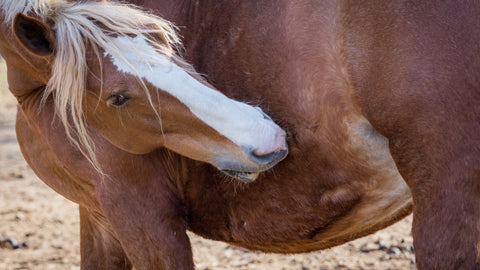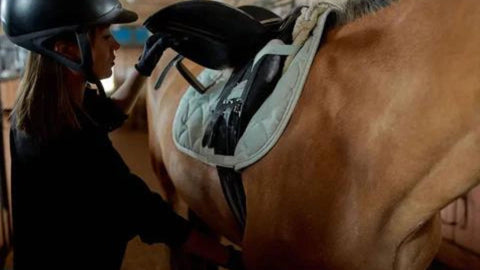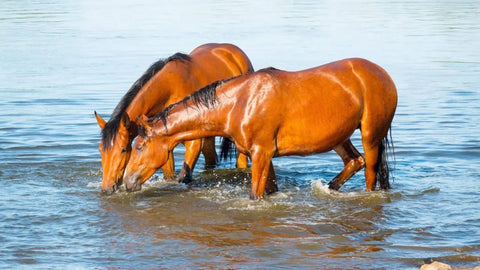
Florian ist aufgewachsen auf einem Bauernhof. Umgeben von Pferden, entdeckte er früh seine Faszination für diese majestätischen Tiere. Inspiriert von seiner reitbegeisterten Mutter, entwickelte er das Nahrungsergänzungmittel - Pferdegold. Seine tiefe Verbundenheit zur Natur und die leidenschaftliche Hingabe zu Pferden trieben ihn an, sein Unternehmen zu gründen.
With the change of seasons, be it from winter to spring or from summer to autumn, unpredictable changes in the weather often occur.
These abrupt changes are not only noticeable for us humans, but can also be stressful for our four-legged friends. When the thermometer constantly fluctuates between warm and cold, this can be particularly problematic for horses.
During these transitional periods, the risk of colic increases, especially when the weather changes abruptly. But why are these weather changes so critical for our horses? And how can we, as responsible horse owners, ensure that our horses stay healthy and happy even during a change in the weather?
Why can a change in the weather cause colic in horses?
Warm, cold, warm, cold : Such weather extremes are pure stress for the horse's sensitive digestion and can often lead to colic.
Colic is definitely not something to be taken lightly, as it is the number one cause of death in horses.
When the weather changes abruptly, the horse's circulatory system is put under great strain and its digestion no longer works as efficiently.
Unfortunately, we can't influence the weather, but there are factors that can reduce the risk of colic.
Adequate exercise, such as in the paddock or pasture, and avoiding stress can significantly reduce the likelihood of colic.
When is colic weather?
Colic weather often occurs during transitional periods, especially when the weather is unstable and fluctuates between extreme temperatures.
Rapid changes from warm to cold or vice versa can put a strain on the horse's circulation and digestion.
Horse owners should be particularly vigilant, especially in times when the weather changes several times within a short period of time .
It is important to observe horses regularly and look for signs of discomfort or stress .
Typical symptoms of colic after a change in weather
Colic is not only extremely unpleasant for the horse, but can also be worrying for the horse owner.
However, there are some signs to look out for:
-
Rolling: The horse tries to roll on the ground , often in an attempt to relieve pain.
-
Yawning: Yawning unusually frequently can be a sign of discomfort.
-
Looking at the belly: The horse looks or bites at its belly .
-
Kicking with the legs: The horse kicks its stomach, often a sign of abdominal pain.
-
Sweating: Some horses may sweat more than usual.
-
Restlessness: The horse shows signs of restlessness, pawing or flehming .
-
Apathy: In severe cases, horses may appear apathetic and lie in unusual positions, such as on their backs.
It is important to consult a veterinarian immediately at the first symptoms of colic.
A veterinarian can correctly interpret the symptoms and initiate the necessary measures.

Other causes of colic in horses
Besides weather changes, there are other factors that can increase the risk of colic in horses. It's important to understand them in order to best prevent it.
Coat change and feed change
Two things are real colic intensifiers : coat change and feed changes . Both further weaken the horse.
Shedding old hair and growing new ones is quite an ordeal for the organism.
During this strenuous phase, the horse needs additional nutrients , which are often not provided in sufficient quantities.
This can lead to problems.
With the changing seasons, the food supply also changes . Instead of fresh green fodder, roughage rich in crude fiber now appears on the plate.
A horse’s intestinal flora is quite a diva.
It takes several weeks for your cat to adjust to a change in diet. Therefore, it's important to manage this transition carefully.
In addition, pre-existing health conditions, such as previous parasite infestations in foalhood , can disrupt the intestinal flora and make the horse more susceptible to colic.

Stress as a trigger for colic
Horses are highly sensitive animals , and their nerves are easily affected. There's a good reason for this: After all, they are flight animals that must constantly be on guard. This makes them particularly susceptible to stress.
- Friction in the group,
- bullying,
- food envy,
- An unpleasant box neighbor,
- The journey in the van,
- The visit to the vet –
All of this can cause stress and upset your stomach.
As a horse owner, you should therefore ensure the environment is as stress-free as possible. If, for example, your paddock neighbor is completely unacceptable, you should seriously consider making a change.
First aid measures
Is your pet showing signs of colic?
Then you need to act quickly! If you suspect colic, do n't hesitate to contact your veterinarian immediately .
He is the expert who can correctly interpret the symptoms and initiate the necessary measures.
A common treatment method, for example, is the drainage of gases from the stomach using a nasopharyngeal tube .
While you wait for the vet, it is important to stay calm and not leave the horse alone.

How can I prevent colic in horses?
Until the vet arrives, you can take some immediate measures .
Most important rule: no food. And, just to be on the safe side, remove the bedding. Some horses ca n't resist, despite their severe pain .
Regarding drinking, it depends on the type of colic.
In cases of colic or constipation, drinking water can even be soothing. In more severe cases, such as a twisted large or small intestine , the horse will likely not want to drink on its own.
But: To do this, you first need to know what type of colic it is.
To stimulate digestion and stabilize the circulation, it is recommended to lead or lunge at a walk .
A few minutes of trotting at a light jogging pace is better. This can relieve mild colic.
If your horse wants to roll or lie down, let him. But encourage him to get up again afterward .
Always pay attention to the horse 's stool and urine output , as these can be important indicators of its condition .

Conclusion
Colic in horses can be triggered by various factors, with changes in weather being a common cause.
As we all know, there's not much you can do about the weather, but as a responsible horse owner, you can take preventative measures. Slowly introducing your horse to grazing and avoiding stress are already important steps in the right direction.
But that alone is often not enough. Proper nutrition and nutrient intake play a crucial role in your horse's health and well-being.

Perfect for your horse: Pferdegold® supplementary feed!
These specially developed supplements support your horse's diet and provide it with natural nutrients. Made in Germany, grain-free and drug-free, they come with a 30-day money-back guarantee.
Try it now!FAQ
How long should you avoid hay after colic?
After a colic episode, the horse should not be given hay for at least 12 to 24 hours. This gives the digestive system time to recover. However, it is important to follow the advice of your veterinarian, as the exact duration may vary depending on the severity and type of colic.
Can hay cubes cause colic?
Hay cubes are generally easy to digest, but as with any feed change, introduction should be gradual.
A sudden change or overfeeding of hay cubes can lead to digestive problems and, in rare cases, colic. Follow the feeding recommendations and monitor your horse carefully.
How many horses survive colic?
The survival rate for horses with colic varies depending on the type and severity of the condition. While many horses with milder forms of colic recover completely, more severe cases, especially those requiring surgery, can be more complicated. However, early detection of symptoms and prompt action can significantly increase the horse's chances of survival.
The most important thing is to call a veterinarian immediately if you suspect colic.
Important:
Pferdegold is not a substitute for veterinary diagnosis or treatment. The information contained in this article is for general informational purposes only and is intended to help improve your horse's well-being.Pferdegold products do not treat or cure diseases , but rather support your horse in compensating for nutritional deficiencies through targeted nutrient intake .
However, they are not a substitute for professional advice from a veterinarian or specialist. If your horse has any health problems, we strongly recommend consulting a veterinarian. Pferdegold assumes no liability for decisions made based on the information provided here.

















